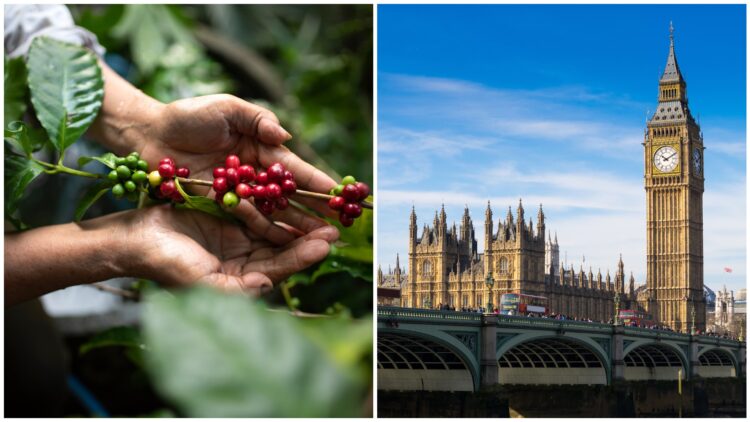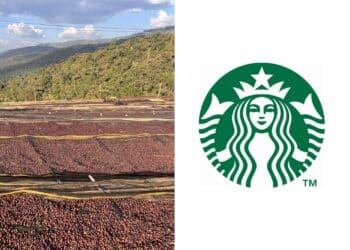High-end UK coffee buyers are nearly tripling regenerative coffee orders in 2025, according to Expocacer, one of Brazil’s top three coffee cooperatives producing 1.5 million bags annually.
The trend – as part of the UK’s fast-growing $4.8 billion coffee market – is seeing regenerative coffee increasingly found in the nation’s “swankier corporate and Big Tech offices” as well as high-end specialty coffee shops in London, the cooperative said.
It also comes as global coffee production declines on the back of climate change.
For 2025, Expocacer reported UK regenerative coffee orders have nearly tripled to 70 metric tonnes from 26 tonnes delivered at the end of 2024. Pre-orders from 22 British roasters for the 2025-2026 harvest are already expected to double again.
The organisation said one of the drivers of this new niche in the UK market is an ECO certification, which is key for British buyers. The certification shows that the producers are not only compliant with ESG practices but guarantees the buyers traceability and knowledge of the origin of the coffee.
“The UK coffee market is growing at a solid rate of more than 6% a year, specialty coffee is booming at more than 10%, while regenerative coffee is booming,” says Bruna Costa, of Bossa Coffee Company in London.
“Coffee production, whether it is instant, specialty or regenerative, has to keep up with local UK demand but not lose its focus on sustainability and quality. This is why regenerative coffee is so promising because it is helping offset the impact of environmental change by packing out plantations with different species of plants in between the rows of coffee trees, bringing back vital wildlife and insects to the farms. It is an opportunity to give back to nature.”
Regenerative coffee, said to be pioneered by producer AgroBeloni of coffee cooperative Expocacer in Brazil, typically involves the planting of five or more different plant species in the corridors between the rows of the coffee trees.
This provides carpets of vegetation, creating a defence for the trees as well as naturally pumping nutrients from the plants back into the soil. Fertilizers are also organic, protecting insects, especially the bees. All of these factors are said to contribute to greater soil protection and health and attract wildlife.
“Our inspiration for regenerative production came from the history of coffee farming in Brazil after traditional coffee production started in the Paraíba Valley, between São Paulo and Rio de Janeiro in the early 19thcentury before it migrated to the Campinas region, then Ribeirão Preto, southern Minas Gerais, and the Cerrado Mineiro,” says Fernando Beloni, Expocacer cooperative chairman and managing partner.
“But why so much change? Traditional farming led to the appearance of pests or diseases, or soil exhaustion, making production no longer viable and requiring farmers to move to other regions.
“As we wanted to continue producing in the Cerrado Mineiro region, so that our children and grandchildren can remain here, we began to study and test new agricultural practices, so that our crops would be sustainable in the long term. This is how regenerative coffee came about.”
Expocacer, which reduced its carbon footprint by 10% through its ESG program in 2024, is expanding its regenerative coffee footprint – and while it now has the equivalent of 21,000 football pitches of regenerative coffee production in place, UK coffee roasters are “just starting to latch onto the environmental benefits” of this specialty coffee type.
“We believe the UK market has the potential to lead regenerative coffee consumption in Europe, setting a trend for other key markets such as Germany, France, Italy and Spain,” says Ítalo Henrique, Expocacer’s Commercial Director.
The UK drinks approximately 98 million cups of coffee per day, according to the British Coffee Association. It is forecast to grow faster than the global coffee market until the end of the decade.





